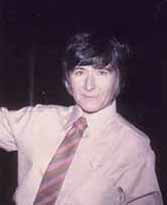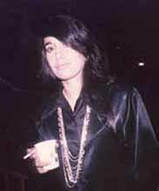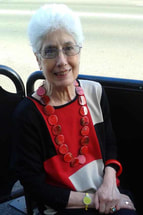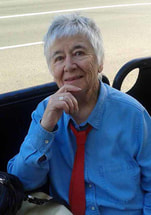WHEN Phyllis Papps and Francesca Curtis moved from Melbourne to Rhyll in 2001, their new neighbours could not have been aware that these two recently retired women had helped to change Australian society.
Smoking together on a stage as they are interviewed for This Day Tonight, they appear comfortable and relaxed and calm. One can only imagine the reality as they became the public face of lesbianism in Australia, risking ostracism from workmates, friends, families, even strangers.
That remarkable act of courage was recognised last month with news that they are to be presented with the 2019 Australian LGBTI Lifetime Achievement Award. They have been invited to Sydney next March to receive the award.
Phyllis says it came as a complete surprise. “I just kept thinking ‘Why us? Why?!'”
I am proud to call Phyllis my friend, and both Phyllis and Francesca my mentors. I'm only surprised they weren't awarded sooner. I’ve admired their literary and political accomplishments but, more than anything, I’ve admired their bravery. They are strong, independent women, advocates for feminism and the LGBTI community who paved the way for us to live as freely and openly as we choose. If it hadn't been for Phyllis and Francesca, marriage equality might still be a pipe dream.
Due to Francesca’s ill health, I couldn't talk with her but I had a delightfully long chat with Phyllis.
She finally accepts that she and Francesca were catalysts for change. “We certainly never tried to claim glory for that but I believe that it was a first step.”
They were willing to be the public face of lesbians and, by extension, the LGBTI movement – although that acronym hadn’t been coined yet. By the end of 1972, the gay liberation movement had truly become a force to contend with, first in Sydney and then all over the country.
But that was yet to come. In 1970, the gay community was firmly shut in the closet with a very small number of lesbian women softly, softly, trying to open the closet doors.
 Francesca Curtis, c 1970
Francesca Curtis, c 1970 At home, a young woman called Phyllis Papps watched the interview in an emotional turmoil. “I realised – after all those years of prejudice and pressure to be heterosexual – that I wasn't alone.”
It started a whole chain of events. The show gave a post office box number for the group. Phyllis wrote in and joined the group. She met Francesca in person. The attraction was immediate. They exchanged wedding rings in July 1970 and have been together ever since. Phyllis says the two are “day and night”: Francesca is the fanciful, creative one while she is logical.
Following Francesca’s TV interview, the Daughters of Bilitis morphed into a new, more structured group called the Australasian Lesbian Movement. Francesca became the first president of the group and Phyllis the first secretary. Meetings were held in their flat in Acland Street, St Kilda, and there were lots of social occasions. Word got around and the social evenings attracted many women who were not members of ALM.
After Francesca and Phyllis appeared together on This Day Tonight later that year, they became the public face of the Australasian Lesbian Movement. Not all the members were happy about the television appearances. “They didn't want that sort of exposure and you can't blame them – they were all in the closet!”
 Phyllis Papps, c. 1970
Phyllis Papps, c. 1970 It's interesting to compare “the closet” of today with the closet of 1970. Phyllis says most of the hatred and vitriol is a thing of the past but fear of professional and personal consequences still holds many people back from celebrating who they are.
Her own activism came from her early years. The child of Greek parents, she arrived in Melbourne from Egypt with her family in 1950. “My brother and I didn't speak English at that stage. We were called Abos ... yes, because we were dark.” She was bullied in her earlier years at school “but that wasn't the word that was used in those days ... we just had to put up with it.”
Francesca's activism was different. “She had lots of gay men friends. She actually mixed more with gay men friends than gay women – well, gay women were invisible, undercover, whatever. I would never describe Francesca as an activist; I would describe her as a pacifist.”
Francesca worked in many of Melbourne’s most prominent bookshops and spent nine years in the social work department of a big hospital. Phyllis’s career spanned 37 years working in public libraries, local government and peak umbrella organisations. Her real passion is research and writing. Since moving to Phillip Island, she has written biographies of independent politician Clare Le Serve and local artist John Adam, a history of the Preserve Western Port Action Group and several articles for the Bass Coast Post.
Both women are heavily involved in our community. They were judges in the Waterline Writing Competition, they are both active members of the Rhyll Community Association, Rhyll RAID and the U3A of Phillip Island and involved in the conservation of animal and bird life.
Our discussion gets on to the subject of politics and Phyllis expresses great admiration for Senator Penny Wong and the new Liberal MP for Wentworth, Kerryn Phelps, two openly gay women who are making their mark on federal politics. We talked about how our own Bass Coast community can move towards equality. She says at least four of the nine current councillors are allies of the LGBTI movement. “That’s how you start, and then you can move on.”
She and Francesca haven’t encountered overt prejudice but Phillip Island sometimes reminds her of Melbourne in 1970. “No gay nightclubs here. I can't even buy a gay newspaper or a gay newsletter or magazine!”
Phyllis says it’s up to people of my generation to take up the fight for equality. “It's up to the younger generation, starting from the grass roots level. Using social media, getting young people into politics ... opposing prejudice, discrimination, and all the other things that are happening with school and education. We absolutely need young people in politics.” She says social media is pivotal, as it was in the marriage equality debate.
I leave feeling inspired. These women are a force to be reckoned with. Their voices rang out a battle cry in 1970, as they still do today.

